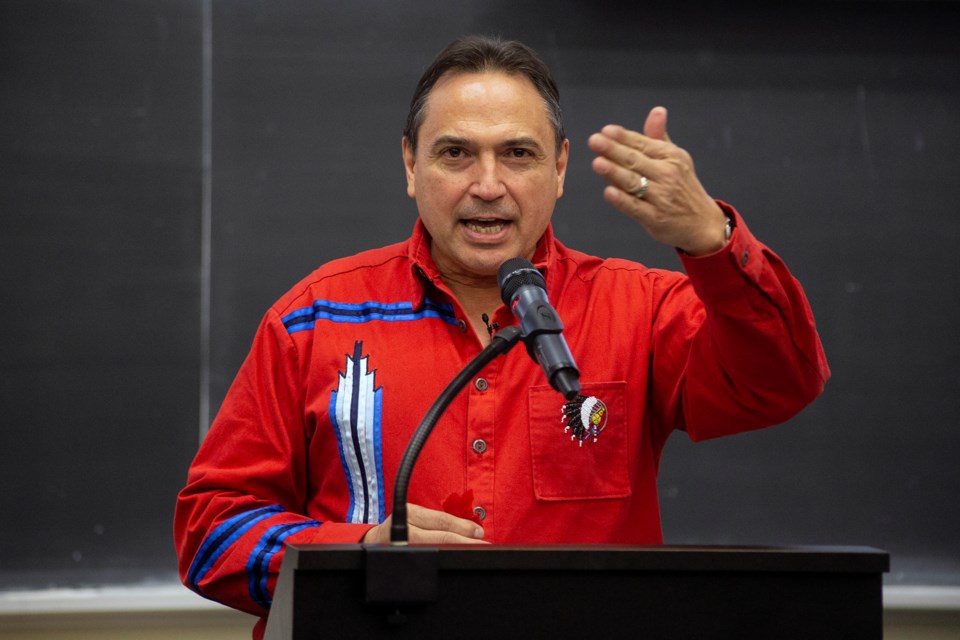National Chief of the Assembly of First Nations Perry Bellegarde says he is encouraging First Nations people across Canada to vote in the upcoming federal election.
In Guelph for a special speaking event at University of Guelph, Bellegarde said it is critical for Canada to implement Indigenous rights and how the Assembly of First Nations is advancing that agenda forward during the 2019 federal election.
Bellegarde received a shout out from the Conservative Party leader during Monday’s English language debate, when Andrew Scheer noted the national chief’s home reserve lies within his own riding.
"That's right, he comes from Little Black Bear," said Scheer during the televised debate. "He has my phone number."
Bellegarde riffed on that shout out a number of time during his speech at U of G’s Alexander Hall in front of about 200 people.
Bellegarde noted that some Indigenous people choose not to vote in Canadian elections, but he encourages them to vote to help advance issues important to them.
“I have embraced my dual citizenship,” quipped Bellegarde. “I wouldn’t get that cell phone if he knew I didn’t vote.”
He noted Indigenous people in Canada were only given the right to vote in 1961 and that some have called him a sellout for participating in Canadian elections.
“Even if my chief says, ‘you’re Little Black Bear, don’t vote’ how are you going to stop me?It’s my right to participate,” said Bellegarde. “I am urging all of our Indigenous peoples to get out and vote. To exercise that. It’s part of our inherent right to self-determination.”
The Assembly of First Nations also encouraged Indigenous people to vote in the 2015 election and Bellegarde said that effort has paid dividends, with investments from the Liberal government in education, housing, water and infrastructure.
He notes that Indigenous peoples do not have a treaty with the Liberals or any other parties, but with the Crown. He said it’s his job as national chief to ensure the concerns of his people are reflected in each party’s platform.
“I have a treaty with the crown, a relationship with the Crown — nation to nation,” said Bellegarde.
A record number of Indigenous people are running for office this election, noted Bellegarde. At least 62 First Nations, Metis and Inuit candidates are running federally and at least one riding has two First Nations women running against each other.
“So we are participating and we are having an impact,” he said.
Another step forward after the last election came as a result of Bill C-91, the Indigenous Languages Act, which has received Royal Assent and is expected to soon become law.
Bellegarde said that bill will help to revitalize languages that were almost lost as a result of the residential school system.
“We didn’t want the residential school system to win,” said Bellegarde. “We didn’t want them to kill First Nations people, to kill the Indian in the child. We didn’t want that to happen.”
Bill C-262, a private member’s bill introduced during the last parliament by NDP member Romeo Saganash, would have required Canada to ensure its laws are in accordance with the United Nations Declaration on the Rights of Indigenous Peoples.
That bill had reached third reading in the Senate.
“Now it has died, it is dead,” said Bellegarde of the bill.
He said some are concerned that allowing the UN declaration to be upheld in Canada will stall major projects, like pipelines.
“People say if you pass the Un declaration it’s going to create economic uncertainty and we are not going to get anything built,” said Bellegarde.
“I argue the other way. It creates economic certainty because ten you know what the rules are. You have to involve the rights and title holders and get them to that table.”
He is working with the political parties in Canada to revive the bill in the next session of parliament, with support so far from the Liberal Party, Green Party and NDP.
“We’re still working on my good friend Mr. Scheer,” said Bellegarde.
– GuelphToday
